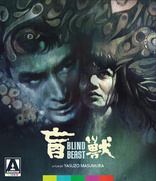Blind Beast Blu-ray Movie
HomeBlind Beast Blu-ray Movie 
Arrow | 1969 | 86 min | Not rated | Aug 24, 2021Movie rating
6.6 | / 10 |
Blu-ray rating
| Users | 0.0 | |
| Reviewer | 3.0 | |
| Overall | 3.0 |
Overview
Blind Beast (1969)
A blind sculptor and his mother kidnap a young model.
Starring: Eiji Funakoshi, Mako Midori, Noriko SengokuDirector: Yasuzô Masumura
| Foreign | Uncertain |
| Drama | Uncertain |
| Horror | Uncertain |
Specifications
Video
Video codec: MPEG-4 AVC
Video resolution: 1080p
Aspect ratio: 2.40:1
Original aspect ratio: 2.35:1
Audio
Japanese: LPCM Mono (48kHz, 24-bit)
Subtitles
English
Discs
Blu-ray Disc
Single disc (1 BD)
Playback
Region A (B, C untested)
Review
Rating summary
| Movie | 3.0 | |
| Video | 3.5 | |
| Audio | 4.0 | |
| Extras | 3.5 | |
| Overall | 3.0 |
Blind Beast Blu-ray Movie Review
Is it possible to have Stockholm Syndrome in Japan?
Reviewed by Jeffrey Kauffman August 11, 2021Tony Rayns has an easy answer which in fact may offer a solution to a veritable litany of society's ills, but which in this case is germane to the genesis of the film under review: blame television. In an introduction to Blind Beast included on this disc as a supplementary feature, Rayns provides a bit of context about the Japanese studio Daiei, where director Yasuzo Masumura spent the bulk of his career, something that Rayns says is a bit of an oddity in the Japanese film industry. The entire industry had been beset with problems for some time, but the advent of broadcast television in Japan, which occurred significantly later than in the United States, suddenly sent the entire movie business into a tailspin, much as it had in the United States a decade or more previously. Daiei was particularly hard hit and became desperate to provide some sort of lure to get ticket buying audiences back into theater seats, and with that goal in mind, they evidently approached Masumura and asked him to come up with something titillating, controversial and unabashedly provocative. The result was Blind Beast, a film that often plays like a Japanese cousin to one of the strangest films to ever bear the imprimatur of William Wyler, The Collector, though even Wyler's film offered a semblance of "reality" that Blind Beast pretty much completely eschews.
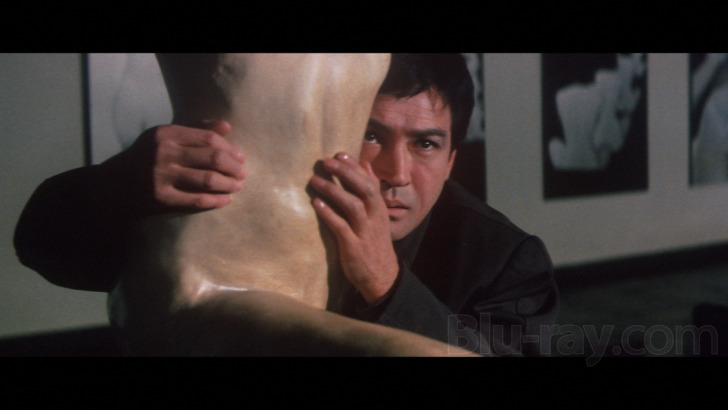
Tarō Hirai was a Japanese fiction writer who is often credited with being one of the prime movers in the field of mystery and detective stories in his native country and whose source novel provided the foundation for this story. If pronounced quickly enough, Hirai's pseudonym Edogawa Rampo (also transliterated as Edogawa Ranpo) may subliminally indicate Hirai's love for Edgar Allan Poe, but Rayns points out that even Poe's infamous journeys through the wending psyches of various disturbed peoples may not equal similar proclivities on the part of Rampo. In that regard it's interesting to note that Rayns mentions Masumura's younger days in Italy, which Rayns states has resulted in all sorts of (specious, according to Rayns) "experts" insisting how the Neorealist movement influenced the nascent filmmaker. Rayns says he sees absolutely no evidence of that "fact", though he does quote Masumura as saying the one Italian film that did make an indelible impact was Visconti's first outing, Ossessione, a kinda sorta remake of The Postman Always Rings Twice.
Put all of these data points together, and you might have at least a glimmer of what transpires in Blind Beast, where a sightless sculptor named Michio (Eiji Funakoshi) kidnaps a model named Aki (Mako Midori) and holds her prisoner in his "studio", which is a massive warehouse in an isolated area which Michio has filled with bizarre pieces of sculptures of various bodies and/or body parts, which ends up making the interior of his domain look much more like something out of German Abstract Expressionism rather than Italian Neorealism.
The plot dynamics play out at least in part rather surprisingly like those in the Wyler film culled from the John Fowles bestseller, with a victim having to enter into a relationship with her captor, and with the woman "maybe, maybe not" pretending to actually fall for the guy. Blind Beast is actually probably a bit more provocative than even The Collector in that regard, since the Samantha Eggar character in The Collector seems to be pursuing a strategy to ensure her eventual freedom, while Aki in this film might be as psychologically roiled as Michio, in her own way. One major difference is that The Collector was in essence a so-called "two hander", while Blind Beast also includes Michio's mother (Noriku Sengoku), who kind of unbelievably helps her son kidnap the poor female, only to later have qualms when she sees what she thinks is a developing romance between them.
There's some supposed metaphysical content here that one assumes may have been injected into the film to make it seem at least a little respectable, or which was perhaps part and parcel of the Rampo original (which I admittedly have never read), but the film may simply be too generally smarmy for any of that to really register. The result is audacious and intentionally shocking, but, kind of like the weird quasi-mannequins in Michio's studio, I doubt many would call it Art.
Blind Beast Blu-ray Movie, Video Quality 
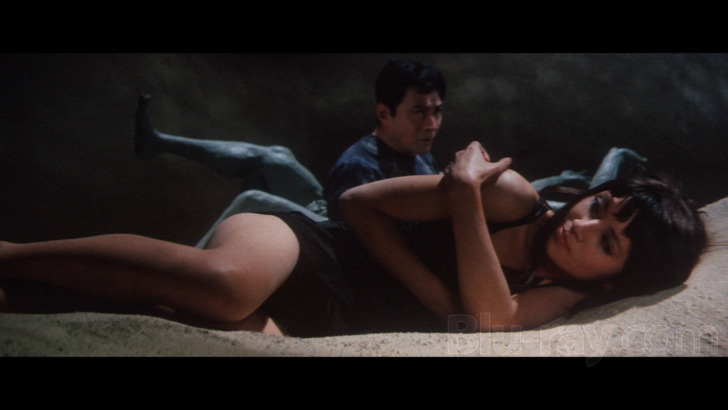
Blind Beast is presented on Blu-ray courtesy of Arrow Video with an AVC encoded 1080p transfer in 2.40:1. Arrow's insert booklet contains only the following fairly generic verbiage about the transfer:
Blind Beast is presented in its original aspect ratio of 2.35:1 [sic] with mono sound. The High Definition master was produced and supplied by Kadokawa, with additional grading by Arrow Films at R3Store Studios, London.This is a relatively soft looking presentation a lot of the time, and as can probably be gleaned from several of the screenshots I've uploaded to accompany this review, huge swaths of the film play out in either total darkness or in very dimly lit environments. As a result, detail levels, and fine detail levels in particular, are often dependent upon how close the camera is to the subject and how much light is available in the frame. The palette looked a bit faded to my eyes, with flesh tones skewing toward browns. This was not a hugely budgeted film, and I wonder if perhaps Masumura and director of photography Setsuo Kobayashi encountered some challenges with lenses, since there are some odd moments that look slightly anamorphically wonky and other moments that have a slightly out of focus, hazy quality.
Blind Beast Blu-ray Movie, Audio Quality 
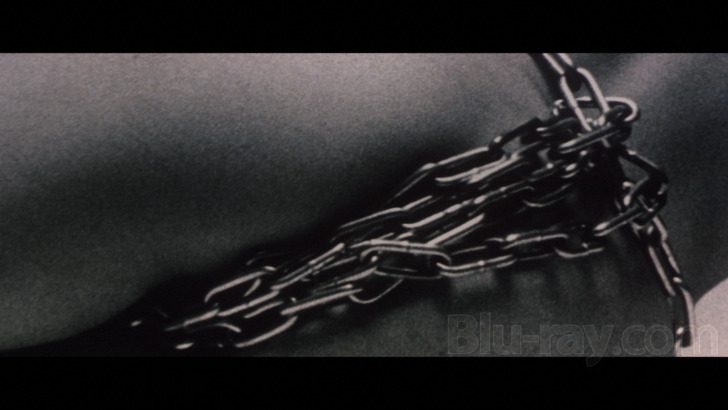
Blind Beast features an LPCM Mono track in the original Japanese. The film's sound design is quite basic, with almost all of the film playing out in the confines of the warehouse art studio, and with dialogue patches frequently offering only the two focal characters. Other elements, like some narration that opens the film, along with all of the other spoken material, sound fine. Optional English subtitles are available.
Blind Beast Blu-ray Movie, Special Features and Extras 
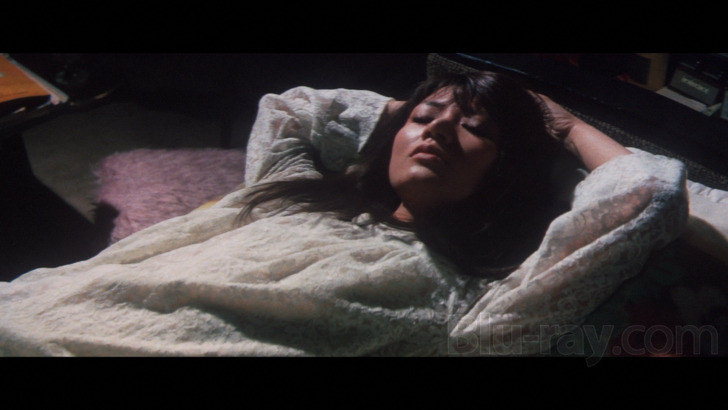
- Audio Commentary by Earl Jackson
- Introduction by Tony Rayns (HD; 18:33) is another really interesting analysis from Rayns, who gets into Masumura and Daiei in general and this film in particular.
- Blind Beast: Masumura the Supersensualist (HD; 10:51) is a new video essay by Edogawa Rampo scholar Seth Jacobowitz, which offers a bit more context for the story.
- Original Theatrical Trailer (HD; 2:25)
- Image Gallery (HD)
Blind Beast Blu-ray Movie, Overall Score and Recommendation 

Arrow has been having a kind of mini-Masumura film festival with a slate of recent releases on Blu-ray, including Irezumi, Black Test Car + The Black Report and Giants and Toys, and my personal advice to newcomers to this particular filmmaker is to probably start with one of those, rather than this peculiar and kind of lurid outing. For the "initiated", however, this is a fascinating if maybe "too weird for its own good" offering that shows Masumura delivering "the goods" (he had been asked to deliver) with a minimal budget. Video encounters some hurdles, but audio is fine, and as usual with Arrow's Blu-ray releases, the supplementary package is outstanding, for those who are considering making a purchase.
Similar titles
Similar titles you might also like

The Untamed
La región salvaje
2016

Neon Bull
Boi Neon
2015

Mustang
2015

Shoplifters
万引き家族 / Manbiki kazoku
2018

The Skin I Live In
La piel que habito
2011

Secret Sunshine
밀양 / Milyang
2007

Spetters
1980

Beanpole
Дылда / Dylda
2019

Onibaba
鬼婆
1964

Transit
2018

...And God Created Woman
Et Dieu... créa la femme
1956

La Bête Humaine
1938

Monos
2019

Tom of Finland
2017

Dheepan
2015

Wild Reeds
Les roseaux sauvages / Slipcover in Original Pressing
1994

A Snake of June
2002

The Past
Le Passé
2013

Le Petit Soldat
The Little Soldier
1963

The Phantom of the Monastery
El fantasma del convento | Indicator Series | Standard Edition
1934
